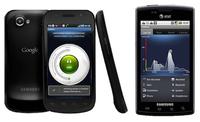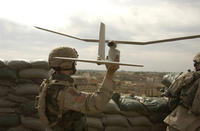-
LMR market to reach $16.2 billion by 2017
Next generation mobile/wireless technologies continue to suffer from coverage and reliability issues, which are key considerations for law enforcement, emergency medical services, disaster recovery, and other public safety applications; as a result, a large number of critical services continue to remain committed to narrowband analog connectivity such as a Land Mobile Radio network; this is good news for the future of the LMR market.
-
-
New app to keep food safer

FoodCheck, an application developed for Android tablet devices, can minimize dangerous and costly errors in food preparation by automating the process of controlling and monitoring food by using wireless temperature monitoring
-
-
Laser weapon to protect ships from anti-ship missiles
Northrop Grumman tests next-generation high-energy, solid-state lasers; the test demonstrated that the laser could burn through the skin and critical components of a target drone used to simulate anti-ship cruise missile threats to U.S. Navy ships
-
-
U.S. severe weather insurance losses in April nearly $1 billion
A series of severe weather events across central and southern sections of the United States caused upward of $1 billion in insured losses. Economic losses were even higher during the month of April
-
-
Detecting suicide bombers from a safe distance
Suicide bombings have now spread to Syria; a Florida company produces equipment designed to aid in the detection of a suicide bomber at standoff distances, before a terrorist can reach his intended target
-
-
Steps organizations should take to prepare for disasters
Even if your company has not been affected by tornados, tsunami waves, or wildfires, all employers need to be prepared for the mayhem that natural disasters cause
-
-
Stun guns increase chances of citizen injury, but protect police officers

Across the United States, some 260,000 electronic control devices, or stun guns, are in use in 11,500 law enforcement agencies; the use of these stun guns by police significantly increases the chances of citizen injury, yet also protects the officers more than other restraint methods, according to the most comprehensive research to date into the safety of stun guns in a law enforcement setting
-
-
Reason-based behavioral recognition system wins award
A reason-based behavioral recognition system for video surveillance developed by Houston, Texas-based BRS Labs wins an award at London’s Counter Terror Expo
-
-
Android app for radioactivity detection

Just-release Android app uses software and the smartphone’s camera to measure radioactivity levels, allowing users to find out whether their environments are safe; the software is the civilian version of technology developed under contracts with the U.S. Department of Defense and with DHS
-
-
Seattle police takes steps to quell drone concerns
The Seattle Police Department recently acquired a small camera-equipped drone, but it remains unused while city policymakers work to calm privacy concerns
-
-
Kansas City to deploy ShotSpotter technology
Kansas City police and the Kansas City Area Transportation Authority have agreed jointly to deploy the Shot Spotter, an acoustic technology that provides detailed information on gunshots fired
-
-
British state-backed reinsurer has £4.5 billion to cover Olympic Games terror-related losses
Pool Re, the British state-backed reinsurer which covers commercial property losses from terror attack-related activities, has £4.5 billion ($7.327 billion) of assets to cover the Summer Olympic Games. Pool Re said it had no plans to jack up premiums for the event. If the damage from bombings or other terror-related incidents were to cost more than that amount, the British taxpayer, under the Pool Re structure, would step in to cover the difference. Pool Re was set up in the 1990s when the U.K. government was worried that the terror campaign pursued by Irish militant groups could make London property uninsurable and damage the national economy.
-
-
Two Taiwanese nationals charged in military technology smuggling plot

Taiwanese nationals engaged in smuggling counterfeit consumer goods and crystal methamphetamine into the United States, are discovered to be working for Chinese intelligence agencies in an effort to smuggle sensitive U.S. military technology out of the United States
-
-
Oklahoma University gets DHS research grant
The University of Oklahoma Health Sciences Center (OUHSC) was awarded a $490,000 grant from DHS for a 2-year study of how law enforcement officers utilize awareness of their surroundings to collect and then analyze intelligence related to potential terrorist threats
-
-
Facebook, antivirus providers in Internet security campaign
Facebook, Microsoft, McAfee, Symantec, Trend Micro, and Sophos have joined in a campaign to make it easier for Facebook users to stay safer and more secure online
-
More headlines
The long view
Factories First: Winning the Drone War Before It Starts
Wars are won by factories before they are won on the battlefield,Martin C. Feldmann writes, noting that the United States lacks the manufacturing depth for the coming drone age. Rectifying this situation “will take far more than procurement tweaks,” Feldmann writes. “It demands a national-level, wartime-scale industrial mobilization.”
Trump Is Fast-Tracking New Coal Mines — Even When They Don’t Make Economic Sense
In Appalachian Tennessee, mines shut down and couldn’t pay their debts. Now a new one is opening under the guise of an “energy emergency.”
Smaller Nuclear Reactors Spark Renewed Interest in a Once-Shunned Energy Source
In the past two years, half the states have taken action to promote nuclear power, from creating nuclear task forces to integrating nuclear into long-term energy plans.
